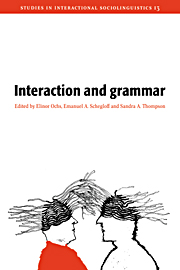Book contents
- Frontmatter
- Contents
- Notes on the contributors
- 1 Introduction
- 2 Turn organization: one intersection of grammar and interaction
- 3 Interactional units in conversation: syntactic, intonational, and pragmatic resources for the management of turns
- 4 Resources and repair: a cross-linguistic study of syntax and repair
- 5 On the “semi-permeable” character of grammatical units in conversation: conditional entry into the turn space of another speaker
- 6 On repeats and responses in Finnish conversations
- 7 “When I come down I'm in the domain state”: grammar and graphic representation in the interpretive activity of physicists
- 8 Transparent vision
- 9 Conversational signifying: grammar and indirectness among African American women
- 10 Creating evidence: making sense of written words in Bosavi
- Appendix Transcription conventions
- Index
1 - Introduction
Published online by Cambridge University Press: 14 January 2010
- Frontmatter
- Contents
- Notes on the contributors
- 1 Introduction
- 2 Turn organization: one intersection of grammar and interaction
- 3 Interactional units in conversation: syntactic, intonational, and pragmatic resources for the management of turns
- 4 Resources and repair: a cross-linguistic study of syntax and repair
- 5 On the “semi-permeable” character of grammatical units in conversation: conditional entry into the turn space of another speaker
- 6 On repeats and responses in Finnish conversations
- 7 “When I come down I'm in the domain state”: grammar and graphic representation in the interpretive activity of physicists
- 8 Transparent vision
- 9 Conversational signifying: grammar and indirectness among African American women
- 10 Creating evidence: making sense of written words in Bosavi
- Appendix Transcription conventions
- Index
Summary
One of sociology's ancestral figures, Emile Durkheim, with whom DeSaussure is often linked, is known (among many other contributions) for the claim that “the social” is not reducible to the psychological or the biological, or the sum of any individual attributes. It is, he said, an emergent phenomenon, a distinct level of organization; it is, he said, a reality sui generis – unto itself, of its own sort (Durkheim, 1938 [1895], 1951, among others). Some cynical (or astute, depending on one's point of view) students of intellectual history, of the history of sociology and of the social sciences more generally, and practitioners of the sociology of knowledge have remarked that this claim needs to be understood as part of a struggle to find a place for sociology in the structure of French academic life at the turn of the century. To have as the object of one's study a domain which was autonomous, which could not be reduced to other people's work and subject matter, was arguably one prerequisite for establishing one's own organizational niche, for establishing one's own standards of quality work, of important problems, of acceptable methods, of distinctive theories, and the like, and the professional license and mandate – the professional autonomy – to administer them.
None of this – even if true – has any bearing, of course, on the theoretical or empirical merit of Durkheim's claim. To hold otherwise would be to commit the so-called genetic fallacy.
- Type
- Chapter
- Information
- Interaction and Grammar , pp. 1 - 51Publisher: Cambridge University PressPrint publication year: 1996
- 72
- Cited by

